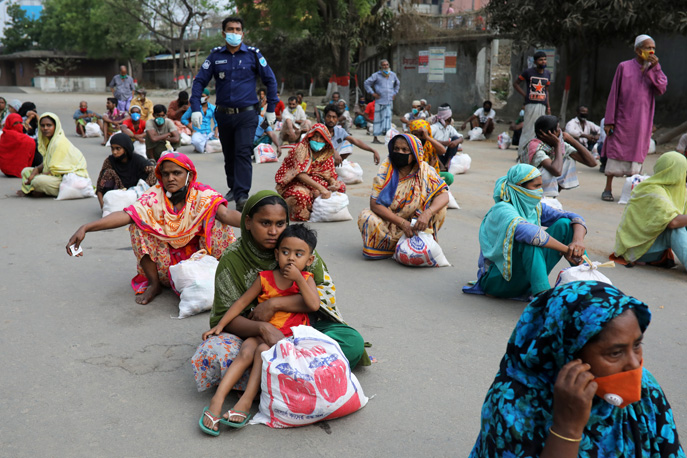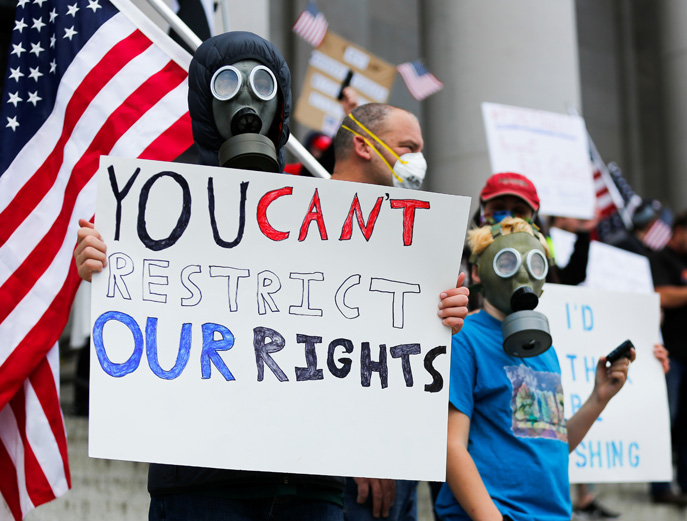Comment: John Morrison of the Institute for Human Rights and Business hopes that as the world picks up the pieces after Covid-19 there will be a fundamental change to the relationship between workers and companies
The 2019 incarnation of the coronavirus has ravaged many lives and the worse is still to come, particularly in the least developed or war-torn economies, where health systems are ill-equipped to deal with chronic symptoms than can arise. The virus has not been the “great leveller” as some have claimed; rather it has highlighted and exasperated inequality worldwide. The bravery of frontline workers has not always been matched by our leaders, with virtue-signalling from populist politicians and some business leaders crying force majeure: letting long established employee or supplier relationships fall like dominos.
But it is not such frailties that we will remember. It is the personal sacrifice of health workers, care workers, supermarket staff, delivery drivers, agricultural workers and many others. Those responsible companies that have stood by their supply chains, repurposed their production for societal need and furloughed their workforces on near full pay, and trade unions that fight for the most marginalised, whether they be members or not (such as informal workers, migrants and those in the gig economy).
Is now is the right time to reorganise the relationship between the world’s peoples and those that claim to act in their interests
It is fitting then to ask whether now is the right time to reorganise the relationship between the world’s peoples and those that claim to act in their interests? For example, the International Trade Union Confederation (ITUC) has restated its call for a “new social contract” for workers and communities globally, backed by NGOs and even some business leaders.
But what is meant by a new social contract? Is it desirable? Is it achievable?
Are we just the co-opting this crisis to advance a pre-existing political agenda?
In this article I want to open up this Pandora’s box a little, with the hope that all of our thinking and talking can lead to some definitive actions.
Social contract thinking can be traced back to Greek philosophy, but is most readily associated with Enlightenment thinkers such as Hobbes, Locke and Rousseau. At its root is the idea that society is best-served if a government or other type of institution takes on executive or sovereign power with the consent of the people (Hobbes invokes the image of an ancient sea-monster, the “leviathan”).

In more modern times, John Rawls advanced a similar idea in his “theory of justice”: part of which allows for inequality within society, provided it benefits its poorest and most marginalised members. There is not one singular social contract theory, and there is not space here to go deep into nuances, but in my 2014 book The Social License I draw out three foundational components that are particularly relevant to societal actors such as businesses and NGOs, as well as governments:
-
Trust All organisations claiming to be societal actors enjoy the confidence of their peers and those most affected by their actions;
-
Legitimacy The organisation must have the support of society and rule in a way that benefits even its poorest members;
-
Consent Members of society must actively grant special permissions.
There are, of course, many other aspects that are critical (benefits, power, remedies and so on) but it is perhaps best to stick with the three foundational aspects for the purposes of this short article. In calling for a new social contract as a result of the Covid crisis, the ITUC is clear that governments are not the only leviathans of the modern age. It points specifically to the accumulated power of multinational corporations as unbalancing the 1919 social contract of the International Labour Organization (ILO) between governments, unions and employers.
Populist leaders constantly invoke 'the will of the people' when consolidating executive power
A new social contract would need to address the fact that while over a billion people have been lifted out of abject poverty over the past 30 years, in large part through globalisation, inequalities within nations have increased dramatically.
Donald Trump, Hungary’s Viktor Orbán and India’s Narendra Modi have offered strong measures to protect their nations from forces lying beyond their borders – a new social contract fuelled by nationalism and populism. These leaders constantly invoke “the will of the people” when consolidating executive power.
In contrast, the social contract advanced by the ITUC differs in that it is based on the labour standards of the ILO. It is, in other words, a social contract in which partnerships to tackle poverty and exploitation transcend national borders.

As we emerge from the Covid-19 crisis it is not clear which of these two versions of the social contract will have the ascendency. It is even less clear whether the new social contract will fundamentally be between the government and its people, or whether business and civil society will also be contracted parties.
The human rights case in relation to the Covid-19 crisis and its emerging economic aftermath seems relatively clear-cut. At the Institute for Human Rights and Business (IHRB) we have recently issued a 60-page report setting out the broad range of civil, political, economic, social and cultural impacts of the crisis. In the report, its main author, Salil Tripathi, reflects that “it is worth remembering that human rights are universal, interdependent, inalienable, interrelated and indivisible. The Covid-19 crisis has shown that in addition to the right to health and life, other important rights, including the rights to equality, livelihood, safety, security, housing and food, are also at stake.”
Business is heavily linked to just about every Covid-related salient human right you care to mention. The ILO estimates that up to 25 million workers are in immediate jeopardy of losing their work, and this will spiral upwards if the downturn deepens. The crisis has shone a spotlight on how reliant we all are on “essential workers” to feed and protect us in times of adversity: workers who at the same time are often poorly paid and vulnerable to many forms of human rights abuse. This correlation between what we truly need from our global economy and protecting the rights of those central to its delivery will be more clearly stated when we emerge from Covid-19. Added to this, shortages and bottlenecks have raised awareness of who makes what and for whom: we might now see more scrutiny about where essential commodities, products and services are derived.
The 'just transition' is in effect a call for a new social contract in ways more fundamental than the legacy of Covid-19
Demands for greater supply chain resilience is likely to be one of the legacies of this crisis. Not everyone will see this in human rights terms; some will promote greater national control of the economy as a matter of dogma, some will invoke nationalism and patriotism as a way of securing stronger domestic protections. But there is certainly a space to advance a rules-based social contract argument if we are clear about its terms.
The hardest question of all is whether a fairer international settlement is achievable in the foreseeable future. There have been many false dawns, from the creation of the UN Global Compact in 1999, in the face of the protests against the World Trade Organization and the G7, to the massive bailout for the financial sector following the 2008 crisis.
On neither occasion, or perhaps at no time since 1945, has there been any major change to the international rights-based contract to upend the international status quo. This is probably why so many of us invoke the spirit of 1919, 1945 or 1948 when advancing fundamental arguments about universal rights.

It would perhaps be naïve to think that 2020 falls into the same category. But then again did any of those years feel like landmark years at the time (Eleanor Roosevelt’s speech of 1958 is perhaps more quotable than those made around the signing of the 1948 Universal Declaration of Human Rights as it benefits from 10 years of hindsight).
Optimists, and I guess I am one, will point to the fact that we already had grounds to believe that a new social contract was essential for reasons of climate mitigation and adaptation. The “just transition” is in effect a call for a new social contract in ways more fundamental than the legacy of Covid-19 will be.
It also requires inter-generational thinking and attention to what justice actually means in contexts of weak institutions and rapid change. Thinkers in the financial sector might now be pondering on how to integrate environmental, social and governance (ESG) issues across their mainstream businesses due to the Covid legacy (see From ‘E’ to ‘S’ and ‘G’ as investors take stock post-pandemic), but it was the climate crisis that broke the back of this argument last year. Simply put, the new social contract can be explained as putting the “S” into “ESG”, but an “S” that is underpinned by trust, legitimacy and consent. The months ahead will unveil new truths and non-truths about the real nature of Covid’s legacy, but a new social contract could indeed be one of these.

John Morrison is CEO of the Institute for Human Rights and Business. His most recent book The Social License, was published by Palgrave MacMillan in 2014. John also sits on the UK Foreign Secretary’s Human Rights Advisory Group.
This commentary is part of our in-depth briefing Building back better: Ethical Corporation examines what Covid-19 will mean for sustainability

